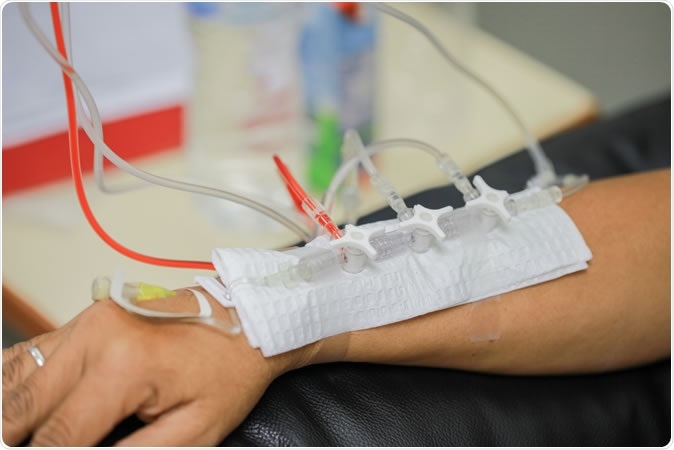Cancer treatments can take a toll on the heart. The agents used to curb cancer cells can damage the heart or peripheral blood vessels. In some cases, they cause problems with clotting or blood lipids.
Almost all chemotherapy drugs have some effect on the cardiovascular system, which isn’t good for health. In many patients receiving anticancer agents, there are noted increasing toxicity observed.
Now, a new study shows that exercise can help protect the heart in people undergoing chemotherapy, improving one’s quality of life. The researchers at the University of Siena in Italy found that patients who receive a tailored exercise regimen or prescription can reduce the risk of heart damage caused by chemotherapy treatment.

Chemotherapy. Image Credit: Chaikom / Shutterstock
Exercise helps protect the heart
Published in the European Journal of Preventive Cardiology, many people with cancer lack exercise and are less active than their healthy counterparts. Promoting exercise and physical activity is important for patients diagnosed with cancer, especially those receiving anticancer agents.
Usually, patients with cancer experience a plethora of complications, which include cardiovascular disease. This results from cardiotoxicity wherein the cancer drug alters the heart function and structure. In some cases, people have accelerated the development of cardiovascular disease, especially in those with other factors, such as elevated blood pressure and increased blood cholesterol levels.
Cancer and CVD share the same risk factors
The researchers also emphasized that cancer and cardiovascular disease share similar risk factors. Hence, it's important for cancer patients to practice a healthy lifestyle, including eating a healthy diet, maintaining a healthy weight, avoiding smoking, and exercising regularly.
The study highlights the importance of implementing an individual exercise plan, which is tailored for each patient. In the exercise regimen, the health care team should take into consideration the patient’s cancer treatment, personal history, personal preferences, and response to exercise.
A team effort
When a patient is scheduled for chemotherapy, the exercise regimen should start prior to the treatment. The whole treatment plan may require a team effort from the health care team, including cardiologists, oncologists, nurses, dieticians, psychologists, and physical therapists.
First, patients should undergo cardiac evaluation, combined with exercise testing. The testing includes lactate testing or cardiopulmonary exercise testing. The test will help determine the patient’s response to exercise. Then, the healthcare team can formulate an exercise dosage, including its training volume, intensity, and type of training. This way, there will be no adverse effects, and the patient’s exercise plan is tailored to his or her needs.
“Defining the intensity and volume of exercise is important for maximising the benefits of physical activity while avoiding muscular soreness, fatigue, and sleep disorders,” Dr Flavio D'Ascenzi from the University of Siena, Italy, and study co-author said.
For patients with cancer and undergoing treatment, exercise is not contraindicated. But, it’s important to consult with their physician before starting a new activity. Plus, guidance is important, especially for patients with other health problems like low hemoglobin levels and low platelet levels. Patients with low hemoglobin levels should avoid intense activities because they need to conserve their energy while those with low platelet levels should avoid engaging in contact activities due to the risk of bleeding.
Moreover, for patients who are frail and weak should not perform activities that can increase the risk of fractures. In cancer patients, they may experience fatigue and exercise can help them cope. The physician should also take note of episodes of breathlessness, so patients may need to rest in between activities.
“Physical activity before, during and after cancer treatment can counteract the negative effects of therapies on the cardiovascular system. In addition, it can relieve symptoms such as nausea and fatigue and help prevent unwanted changes in body weight,” D’Ascenzi added.
Journal reference:
D’Ascezi, F., Anselmi, F., Fiorentini, C. et al. (2019). The benefits of exercise in cancer patients and the criteria for exercise prescription in cardio-oncology. European Journal of Preventive Cardiology. doi:10.1177/2047487319874900, https://journals.sagepub.com/doi/10.1177/2047487319874900